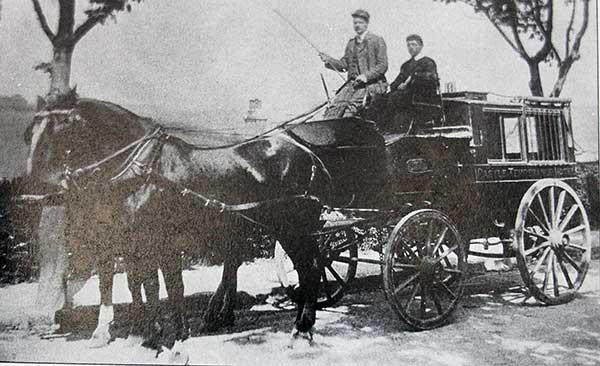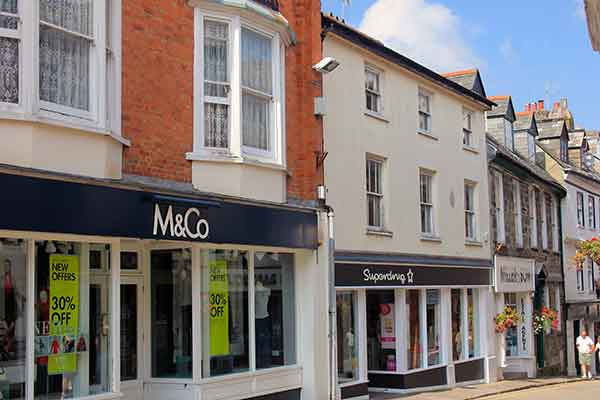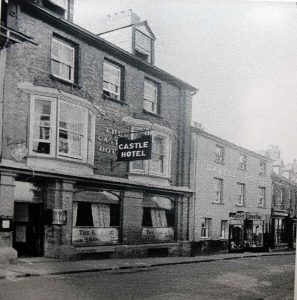.
The Queens Arms Inn stood in Launceston before 1700, when the street was called Market Street. The Inn was once occupied by Mr John Smith, vintner, and later taken by Mr Christopher Martin (or Martyn), then by his widow, Elizabeth; after this their son Henry held the license, which passed to his widow, Frances.
By 1747 the Inn was held by Mary Kelly, widow, and her spinster sister, Anne Carpenter. The Queens Arms Inn was quite renowned during the eighteenth and early nineteenth centuries as a respected haunt for the more prosperous tradesmen, and, through contractors, providing a regular, reliable carrier service to outlying villages and towns.
In 1823, the landlord was Mr Edward Acres, who died at the age of 51, weighing twenty-one stones, in 1826. By 1830 the Inn had had a name change and was then known as The Exeter Inn, Butter Market Street, with William Radmore the Inn Keeper; in 1852 it was held by Thomas Colville, Inn Keeper, High Street.
In 1856 Mr Charles Browning was the landlord of the Exeter Inn, High Street, Launceston.
July 7th, 1858: HURDON DOWN, LAUNCESTON: To Be Let by TENDER, for a period of Seven, or Fourteen Years, as may be agreed, from Michaelmas next, about 10.1/2 acres of productive Land [be the same more or less], at Hurdon Down in the Parish of St Mary Magdalene, in the Borough of Launceston, the property of Mr Mary Barrett, and now in the occupation of Mr John Jury, whose term expires at Michaelmas next.
The Ground is in full cultivation and can be viewed, being a short distance from the Town of Launceston. TENDERS to be Delivered to Mr W Cudlipp, London Inn, Launceston, on or before the 14th day of August next. The Owner will not be bound to accept the highest Tender.
The Cornish Times of 1869 reports the birth to the wife of William Cudlipp of the Exeter Inn of his twenty-second child in February of that year. The 1871 census returns give The Exeter Inn, High Street, William Cudlipp, 64, Innkeeper, rate collector, Launceston, wife Emma H, 39; dau’s Emma 32; Annie 11; son Tom 10; dau Minnie 2 and dau Flora under One month. The Cornish Times of Saturday 9th October 1878, reports the birth of a daughter, at the Exeter Inn, High Street, Launceston, to the wife of Mr Francis Sambell, on Thursday 7th October of that year. In 1878, Mr William Cudlipp, senior, is described as a Collector of Poor Rates for the Parish of St Mary Magdalene, Board of Health Rates for St Thomas Street, St Stephen’s, and Part Lawhitton, The Exeter Inn, High Street; and gives the information that William Cudlipp, junior, held the license at The Bell Inn, Tower Street.
Cornish Times, 1885. Marriage: On Wednesday, September 8th, by license, at Launceston Church, by the Reverend GB Gibbons, Mr William Cudlipp, senior, of the London Inn, Launceston, to Miss Emma Allen, of the same place.
County Court, Launceston – August 15, 1885: William Cudlipp v Richard Clark. Claim for goods and money lent, amounting in all to £1. 11. 6d. Plaintiff is an Innkeeper, and the things supplied were beer and tobacco. The defendant is a Crimean hero, having assisted in storming the Redan on the 8th September 1855, where he was wounded in the neck; he has since been discharged with a pension.
Judgment for the Plaintiff, to be paid on the 10th September, next.
EXETER INN, LAUNCESTON: J ROWE Begs to inform Inhabitants of Launceston and the Public generally, that he has taken the above-named INN, where he hopes by continued attention to its business to merit a share of public patronage. N.B. Good Stabling, well-aired Beds, Dressed Meat, and every requisite for travellers constantly and cheaply supplied.
Post & Weekly News, 1st Jan, 1881: To Those Attending LAUNCESTON MARKET & Others.
BARRETT & WOODS Beg to Inform their Friends and the Public that they have removed into a more spacious and commodious house called the Exeter Inn, next door to their late premises in High Street. Hot Dinners on all Market Days. Private Parties can be accommodated with separate rooms if required. Excellent Bed-rooms and well-aired Beds.
The Census of 1881 gives the following information: The Exeter Inn, High Street, Launceston –
Thomas Woods 31 currier and inn-keeper Honiton, Selina wife 28 St Mellion, Rozinan dau 7 Launceston, Hetty B dau 4 Launceston, Lilly dau 1 Launceston.
Northgate Street:
William Cudlipp 74 Municipal Rate Collector Launceston, Emma H wife 49 Launceston, Minnie dau 12 Launceston, Flora B dau 10 Launceston.
Mr William Cudlipp died in Northgate Street and was buried 1st August 1890, aged 87 years.
Over the years The Exeter Inn gained a bad reputation in keeping a disorderly house cumulating in it being sold on the 7th April 1894, the Exeter Inn was put up for sale by auction conducted by Mr J. Kittow, auctioneer, Launceston at the White Hart Hotel, Launceston by its then-owner by Mr T. Shearme. There were over 50 gentlemen present. The bidding was started by Mr S. Drew at £500, that being followed by a bid of £510 by Mr J. Treleaven, jun. on behalf of the Temperance Association. Mr R. Wevill followed with a bid of £625. The bidding went up to £775, Mr Treleaven being responsible for the same. Mr Hicks, a wine merchant of St Austell, made one offer, Mr Wevill offered £800, Mr C.H. Gillbard followed with £810. After a bid of £820 Mr E. Hicks, of Launceston, closed the sale with an offer of £825. This did not reach the reserve, but the best bidder has the first offer of treating. Mr C. H. Peter, solicitor, acted for the vendor. Edward Hicks who was acting on behalf of the local Temperance Association, being the highest bidder agreed to purchase the inn at a sum slightly in excess of his final bid of £825. The aim was to re-build the inn as a temperance hotel.
Cornish & Devon Post 14 April 1894: Sale of Exeter Inn. Mr Edward Hicks, of High Street, who was the highest bidder at the auction sale of the Exeter Inn, conducted by Mr Kittow, auctioneer, on Thursday of last week, became the purchaser of the premises on the following Friday at a sum slightly in excess of his bid (£825).
P & WN 14 April 1894:- THE EXETER INN, Launceston. Mr E. Hicks, who made the highest bid for this property at the sale last week, has since completed the purchase. Strenuous efforts are being made by the local Temperance Association to convert the building into a temperance hotel. Circulars have been issued inviting the townspeople to take shares in a limited company (capital £2,500) to be formed to acquire the premises, and rebuild as a first-class temperance hotel.
The Launceston Hotel Company was thus formed and the Exeter Inn became the Castle Temperance Hotel. In October of 1894 tenders were placed for the construction on the site of a new building to a design of Mr Otho Peter with the winning bid by Launceston contractor Mr Ephraim Sharland for the sum of £1,112 10/-. Mr A. G. Wenmoth had the contract for the plumber’s work required. The building was completed on the 5th of July 1895, with Mr W. Bailey, its proprietor. Mr Bailey married the daughter of Mr & Mrs Martin, servants to Miss Caroline Pearse of Lawrence House, and they later lived at Castle Street before retiring to Dunheved Road.
On the 29th October 1895, three months after opening for business, a dinner was laid on by the directors of the company owners for the architect, contractor, and other workmen employed on the erection of the new hotel. The chair was taken by Mr James Treleaven, junior, and other directors present included Messrs Edward Hicks, T. H. Nicolls, T. W. Bate, and J. H. Cory. E Nicolls (hon. sec., of the Launceston Temperance Association), T. N. Wenn (secretary of the hotel company), O. B. Peter, FRIBA (architect), and E Sharland (contractor) – the whole company numbering some sixty to seventy persons. Several people being unable to attend, one, for instance, the chief mason on the building, who walked five miles to a country station only to find that the train he wished to catch did not stop there.
An excellent dinner was provided by Mr Bailey, the tenant, in the large room at the rear of the premises. At the conclusion of the repast and tobacco and drinks (non-alcoholic) having been served, the Chairman submitted the loyal toasts, which were heartily received.
After apologising for the absence of three lady directors (Mrs Treleaven, senior, Miss Nicolls, and Mrs Thomas), Mr J Rawling, Messrs Dingley & Company, bankers, Mr Sharply, auditor, and the vicar (Rev T J Nunns), a part of whose kind letter he read, the Chairman called on Mr J H Cory to propose “The health of the architect and contractor”. They all knew, said Mr Cory, that before a house could be erected, there must be a great many pencil scratches made, and many pieces of paper spoilt, and that was particularly so in the present case. There were difficulties in the ground encountered everywhere, but when they had to wedge themselves in between neighbours, as was the case with the Hotel Company, the difficulties were far greater. But, in their architect, they had a gentleman of great ability – as the successful completion of their splendid building on the site of an old tumble-down public house testified
Mr Cory further said he was proud to be connected with such a great building and such an able architect, one who gave great strength of character to their neighbourhood. Seeing what could be achieved with a contractor like Mr Sharland, workmen like he employed, and an architect like Mr Peter, he sometimes wished he was in the position of an employed himself.
In reply Mr Peter said he felt something like the old Exeter Inn, rather shaky; he thanked the directors for the spread, and the contractor and workmen or their endeavours to carry out his designs. It had not been easy for him to crowd in the space available, all the rooms required, nor had it been an easy matter to steer clear of party walls, right of light, etc., but he believed he had gone as clear a course as possible. He wished the Hotel Company ever success. Mr Sharland said that they had tried as workmen to do their level best, and he hoped the hotel would be a success. He was proud to have carried out the work under Mr Peter, whom he heartily thanked for the kindness he had evinced.
Mr Nicolls next spoke submitting success “To the Launceston Temperance Hotel Company, Ltd.”, thanked the directors for inviting him to the meal as a representative of the Launceston Temperance Association members of which were mainly responsible for the initiation of the scheme, and said he was informed that great business had been done during the first three months, which gave him great encouragement.
Several more toasts were proposed and drunk too, amid applause and congratulations, including “The Press”, by Mr T. H. Nicolls, and responded to by Mr Lyne, for The Post, and thanks from the Chairman to the ladies, including Mrs and Miss Hicks, who had given their services gratuitously, and he referred to the work done by the company’s secretary, Mr T. N. Wenn, and the proceedings terminated with the National Anthem.
Songs were contributed during the evening by Messrs. R. Atkins, J. Oke, junior, F. Gale, H. Strike, and W. H. R. Atkins.

Mr John Beckley Smith was a native of Boyton where he farmed for many years before taking over the Castle Hotel from Mr William Bailey in 1914. Mr Smith retired in 1939, celebrated his Golden Wedding anniversary in September 1943, and died at the age of 80 years on Thursday, 30th December 1943. After retiring Mr and Mrs Smith went to live at ‘Wycollar’, 26 Tavistock Road.
Soon after taking on the tenancy of the Temperance hotel Mr Smith began a carrier’s business then a bicycle business in the town which, in turn, grew into a garage and motor dealers. Kelly’s Directory of 1923 – Castle Hotel (unlicensed), commercial & family; posting in all its branches; cars on hire, omnibus meets all trains (J B Smith & Son, proprietors)High St. In 1926 – Smith J B & Son, Castle Temperance Hotel, High Street, and motor garage & livery stables, Western Road: in 1939 it had changed to – J B Smith & Son Ltd., Castle Temperance Hotel, High street, with a further entry – Smith J B & Son (Launceston) Ltd., motor garage, Western road, and by 1956 the title was Smith & Son Ltd., Messrs J B, Castle Garage, Western Rd.
The firm later had a garage at The Dockey called the Castle Garage but, outgrowing this site, sold it for development (now a block of flats) and started a new garage on the Pennygillam estate which was subsequently taken over by Spry’s.
During World War Two the Castle Hotel was requisitioned by the American Army as quarters for their officers; after the war, the premises became the Castle Cafe.
The lower building contained the Folley’s and Reynolds shop and is one of the most missed shops in Launceston with many people still remembering the establishment. The buildings are now occupied by M&Co and Millers estate agents (below).

Visits: 87

